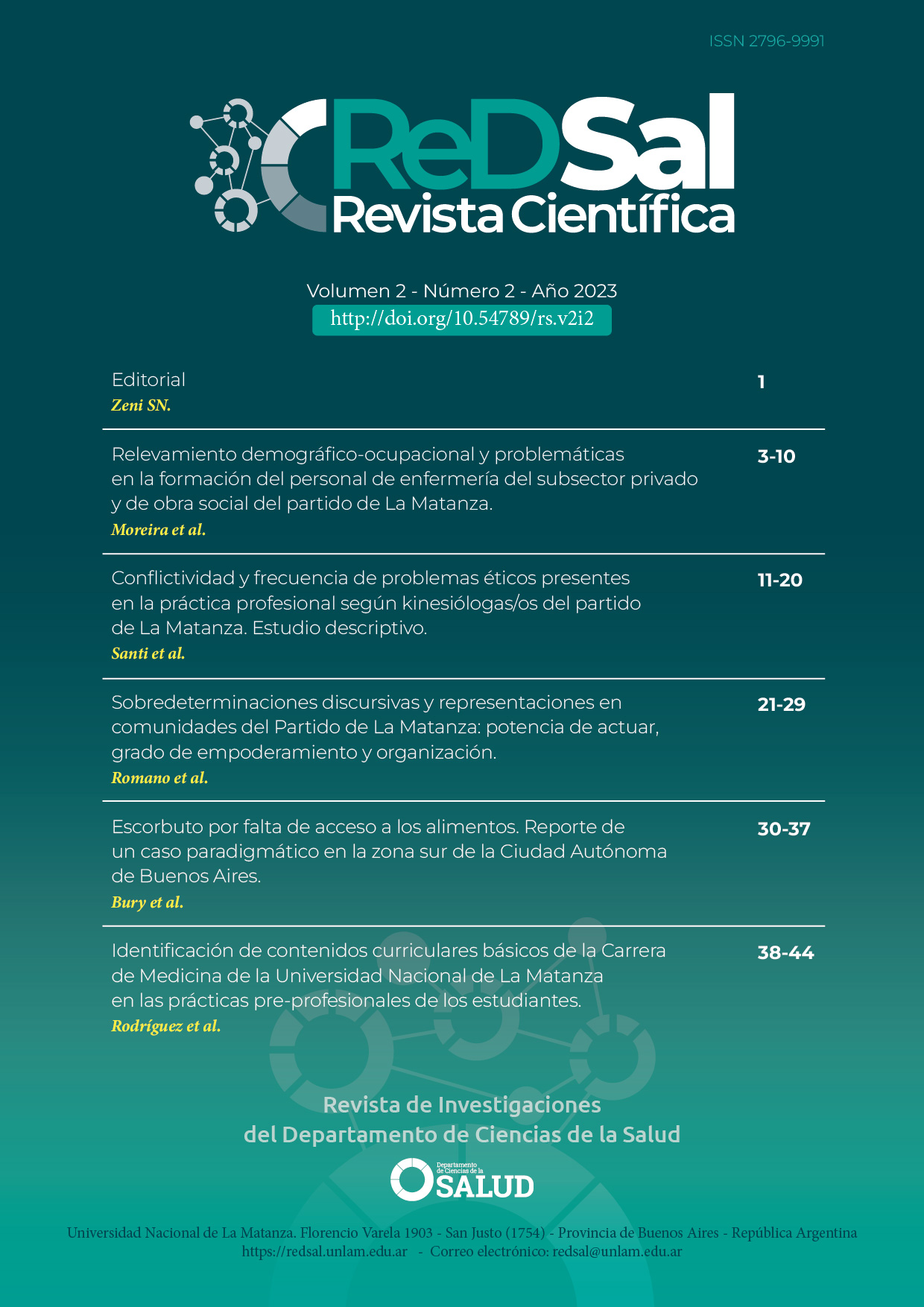Demographic-occupational survey and problems in the training of nursing personnel in the private and social security subsector of the district of La Matanza.
DOI:
https://doi.org/10.54789/rs.v2i2.21Keywords:
nursing personnel, continuing nursing education, continuing education, demographics, nursing research, instruction for nursesAbstract
Objective. To identify the demographic-occupational
characteristics and the training problems of the nursing
personnel in the private and social security sectors of La
Matanza.
Materials and methods. A quantitative-qualitative study
was carried out by means of surveys. The sample was
non-probabilistic for convenience. Date were collected
between the second semester of 2021 and the first semester of 2022.
Results: We worked with a sample of 152 units, 82.9% were female and the mean age was 38.33 years. Regarding their level of training, 38.42% were nurses, 53.64% were nursing bachelors, 3.97% were nursing assistants, and 5.30% had postgraduate studies. A total of 68.03% participated in some type of training not related to COVID-19 in the last four years. Among those who received training, 83.33% mentioned that they were mostly free. Regarding the type of training chosen, 33.84% attended talks given by their work institution. As per COVID-19, 72% received training, mostly free of charge and mainly through talks delivered by their work institution.
Conclusion: This investigation allowed us to fulfill the objective of characterizing the nursing staff of the private and social security sectors of La Matanza district. In relation to the level of training of nursing personnel, the private and social security sectors of La Matanza district are well above the national average and better positioned than the public sector of the district.
References
Guaña Bravo ES, Ramírez Pérez T, Mariño Cano H, Ávila Peña Y. Factores que influyen en la educación continua desde la perspectiva del profesional de enfermería. Sinapsis. 2020; 1(16).
Ley N°24.004. Ley de ejercicio de la enfermería. Boletín Oficial de la República Argentina. 23 de octubre de 1991.
Consejo Internacional de Enfermeras. Código de Ética del CIE para las Enfermeras Ginebra: Consejo Inernacional de Enfermeras; 2021.
Schneider M, Good S. Afrontar los retos de la formación del personal de enfermería. Nursing [Internet].; 2019 [cited 2022 Sep 14 ; 36(2): 47-48. Available from: https://www.elsevier.es/es-revista-nursing-20-pdf-S0212538219300445.
Moreira S, Surbano-Rodriguez V. Relevamiento demográfico-ocupacional y problemáticas en la formación del personal de enfermería del subsector público del partido de La Matanza. ReDSal. 2023; 1(2): p. 30-37.
Ministerio de Salud. Plan Nacional de Cuidado de Trabajadores y Trabajadoras de la Salud en el Marco de la Pandemia COVID-19. [Online].; 2020. Available from: http://servicios.infoleg.gob.ar/infolegInternet/anexos/335000-339999/338417/res987.pdf.
Ley N°27.548. [Online].; 8 de junio de 2020 [cited 2023 marzo 28. Available from: https://www.boletinoficial.gob.ar/detalleAviso/primera/230239/20200608.
OFERHUS – Dirección Nacional de Talento Humano y Conocimiento. Estado de situación de la formación y el ejercicio profesional de Enfermería en Argentina. [Online].; 2021 [cited 2023 marzo 28. Available from: https://www.argentina.gob.ar/sites/default/files/20210-04-28-situacion-enfermeria-abril_2021.pdf.

Downloads
Published
How to Cite
Issue
Section
License
Copyright (c) 2023 ReDSal

This work is licensed under a Creative Commons Attribution 4.0 International License.








